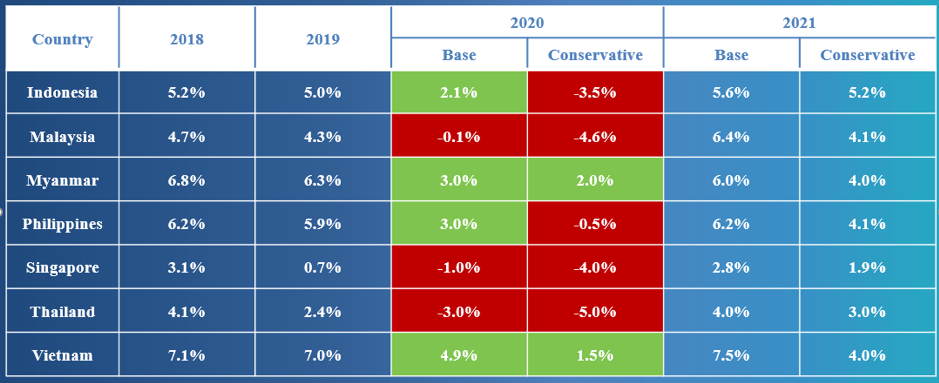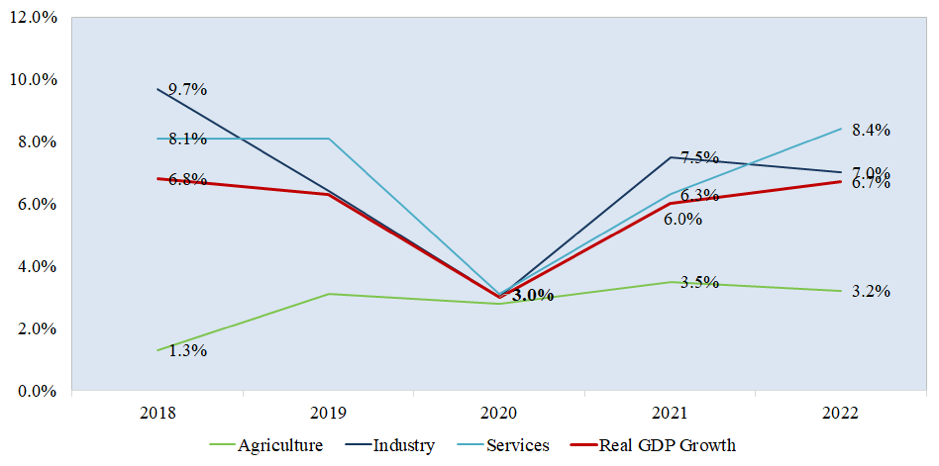Myanmar and other Southeast Asian economies are taking a huge hit caused by the spreading COVID-19 pandemic. Our Partners, Naithy Cyriac and U-Yun Wong were invited by Singapore Business Federation to share insights on mitigating strategies and positioning for recovery opportunities for businesses in Myanmar to cope with the COVID-19 crisis through an interactive webinar.
Economic Impact on ASEAN
As of 8 April 2020, ASEAN reported 15,477 confirmed cases with more than 525 deaths, with 22 confirmed cases and 3 deaths for Myanmar. Several key sectors have been affected, particularly travel and tourism, retail, hospitality, logistics, and manufacturing.
ASEAN Year-on-Year Annual GDP Growth Rate

The Indonesian and Thai currencies have weakened to levels observed during the 1998 Asian crisis. Singapore, the global transshipment hub, posted the worst ever purchasing managers’ index (PMI) score. Thailand is also expected to record the lowest base GDP decline in ASEAN.
Myanmar Impact Assessment
Despite its close border with China, Myanmar detected zero cases of COVID-19 up until 22 March 2020. The government has taken several measures, including international entry restrictions, lockdown for Thingyan, and the USD 70 million stimulus package.
However, with Myanmar’s heavy trade reliance on China, it is expected to reduce 6.3% GDP growth observed in 2019 to 3% in 2020.

Several key sectors in Myanmar are also heavily impacted. Tourism-backed sectors have to remain muted in the medium term. Around 38 factories have shut down, impacting around 17,000 workers. Agricultural exports have been impacted, as approximately half exported to China. Most construction projects are also halted and Myanmar’s gas export revenues will continue to be under pressure.
The Economic Path Ahead
The webinar presented mitigating strategies for businesses during this crisis. First, boosting demand will be crucial for business recovery, as the impact of demand shocks will outlast supply chain disruptions. With ASEAN emerging as a manufacturing alternative to China, governments and companies also need to prepare the related infrastructure to support investments and supply chain efficiencies.
As for M&A activities, startup valuations are especially perceived to be more reasonable during this weaker economic time. Lastly, it is crucial for countries to integrate, automate, and move up the value chain due to labor movement restrictions.
Adding depth into the discussion, Rajah Thann’s Partner, Chester Toh, also pointed out the law concept of ‘force majeure’. In this challenging time, enforcing such a clause may be the ideal option for the affected businesses to avoid being in breach of contract, assuming that COVID-19 constitutes an event of force majeure. This is governed under Section 56 of the Myanmar Contract Act, 1872.







